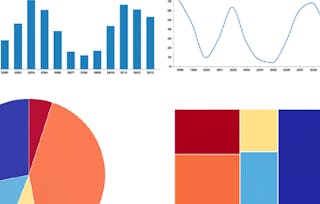Computeranwendungen, die mit großen Datenmengen arbeiten - die Domäne der Datenwissenschaft - haben Auswirkungen auf das Leben der meisten Menschen in den USA und auf der ganzen Welt. Dazu gehören Empfehlungen, die uns von internetbasierten Systemen gegeben werden, Informationen, die online über uns verfügbar sind, Techniken, die für Sicherheit und Überwachung eingesetzt werden, Daten, die im Gesundheitswesen verwendet werden, und vieles mehr. In vielen Fällen sind sie von Techniken der künstlichen Intelligenz und des maschinellen Lernens betroffen. Dieser Kurs untersucht einige der ethischen Fragen im Zusammenhang mit der Datenwissenschaft mit dem grundlegenden Ziel, Fachleute der Datenwissenschaft für ethische Überlegungen zu sensibilisieren, die in ihrer beruflichen Laufbahn auftreten können. Dies geschieht durch eine Kombination aus der Diskussion ethischer Rahmenbedingungen, der Untersuchung einer Vielzahl von Anwendungen der Datenwissenschaft, die zu ethischen Überlegungen führen, der Lektüre aktueller Medien und wissenschaftlicher Artikel sowie der Nutzung der Perspektiven und Erfahrungen von Kommilitonen und Informatikern. Ethical Issues in Data Science kann als Teil des Master of Science in Data Science (MS-DS) der CU Boulder auf der Coursera-Plattform belegt werden. Der MS-DS ist ein interdisziplinärer Studiengang, der Dozenten aus den Fachbereichen Angewandte Mathematik, Informatik, Informationswissenschaft und anderen der CU Boulder zusammenbringt. Da die Zulassung leistungsabhängig ist und es kein Bewerbungsverfahren gibt, ist der MS-DS ideal für Personen mit einem breiten Spektrum an grundständiger Ausbildung und/oder Berufserfahrung in Informatik, Informationswissenschaft, Mathematik und Statistik. Erfahren Sie mehr über das MS-DS-Programm unter https://www.coursera.org/degrees/master-of-science-data-science-boulder.

Ethische Fragen in der Datenwissenschaft

Ethische Fragen in der Datenwissenschaft
Dieser Kurs ist Teil von Spezialisierung für Wichtige Fähigkeiten für Data Science
Unterrichtet in Deutsch (KI-Synchronisation)

Dozent: Bobby Schnabel
4.250 bereits angemeldet
Bei enthalten
49 Bewertungen
Empfohlene Erfahrung
Was Sie lernen werden
Die Lernenden sind in der Lage, ethische Situationen zu erkennen und zu bewältigen, die in ihrer beruflichen Laufbahn auftreten können.
Die Lernenden werden in der Lage sein, ethische Rahmenwerke anzuwenden, um ethische Herausforderungen zu analysieren.
Die Lernenden werden mit den wichtigsten Anwendungen der Datenwissenschaft vertraut sein, die häufig mit ethischen Fragen verbunden sind.
Kompetenzen, die Sie erwerben
- Kategorie: Algorithmen für maschinelles Lernen
- Kategorie: Datenverarbeitung
- Kategorie: Datensicherheit
- Kategorie: Ethik im Gesundheitswesen
- Kategorie: Ethische Standards und Verhaltensweisen
- Kategorie: Künstliche Intelligenz
- Kategorie: Datenethik
- Kategorie: Informationen zum Datenschutz
- Kategorie: Verantwortungsvolle KI
- Kategorie: Bewusstsein für Vielfalt
- Kategorie: Algorithmen
- Kategorie: Medizinischer Datenschutz
- Kategorie: Fallstudien
- Der Abschnitt "Fähigkeiten" ist zugeklappt. Zeigt 7 von 13 Fähigkeiten.
Wichtige Details

Zu Ihrem LinkedIn-Profil hinzufügen
4 Aufgaben
Erfahren Sie, wie Mitarbeiter führender Unternehmen gefragte Kompetenzen erwerben.

Erweitern Sie Ihre Fachkenntnisse
- Lernen Sie neue Konzepte von Branchenexperten
- Gewinnen Sie ein Grundverständnis bestimmter Themen oder Tools
- Erwerben Sie berufsrelevante Kompetenzen durch praktische Projekte
- Erwerben Sie ein Berufszertifikat zur Vorlage

In diesem Kurs gibt es 5 Module
Dieses Modul beginnt mit einer Einführung in den Kurs, einschließlich der Motivation für das Thema, der Kursziele, der Themen, die im Kurs behandelt werden, und der Erwartungen an die Studenten. Anschließend werden die drei ethischen Rahmenwerke besprochen, die am häufigsten auf ethische Diskussionen in den Bereichen Datenwissenschaft und Informatik angewendet werden: Kantianismus/Deontologie, Tugendethik und Utilitarismus. Anhand von Fallstudien werden die Anwendung und die Eigenschaften dieser Rahmenwerke veranschaulicht.
Das ist alles enthalten
5 Videos6 Lektüren1 Aufgabe3 Diskussionsthemen
Dieses Modul beginnt mit einigen Hintergrundinformationen über das Internet, das die Grundlage für die meisten der Themen bildet, die wir in diesem Kurs behandeln. Anschließend werden die beiden grundlegenden ethischen Fragen bei der Nutzung des Internets, nämlich Datenschutz und Sicherheit, im Zusammenhang mit der Datenwissenschaft erörtert. Es wird eine Reihe von realen Fallstudien und Beispielen für beide Themen durchgespielt, um die Vielfalt der Probleme zu verdeutlichen.
Das ist alles enthalten
5 Videos2 Lektüren1 Aufgabe1 peer review2 Diskussionsthemen
Dieses Modul bietet einen Einblick in die ethischen Fragen des Berufs und des Arbeitsplatzes in der Datenwissenschaft (im Gegensatz zu den technischen Themen der Datenwissenschaft). Es beginnt mit der Erörterung von zwei hochrelevanten berufsethischen Kodizes, die von Berufsverbänden der Statistik und der Informatik stammen. Anschließend wird eine Reihe aktueller ethischer Probleme am Arbeitsplatz in Technologieunternehmen behandelt. Ein wichtiger Teil dieses Moduls ist die Befragung eines Datenwissenschaftlers zu ethischen Fragen, die er in seiner Karriere erlebt hat.
Das ist alles enthalten
4 Videos2 Lektüren1 Aufgabe1 peer review1 Diskussionsthema
Algorithmische Voreingenommenheit ist vielleicht das Thema, das man am meisten mit ethischen Fragen in der Datenwissenschaft in Verbindung bringt. In diesem Modul werden zunächst einige allgemeine Hintergrundinformationen zum Thema algorithmische Voreingenommenheit gegeben und verschiedene Ansichten über die Vor- und Nachteile algorithmischer gegenüber menschlicher Entscheidungsfindung erörtert. Anschließend wird eine Reihe von Beispielen für algorithmische Voreingenommenheit in Bezug auf Geschlecht und Rasse besprochen, was eine besonders wichtige Klasse von Fällen algorithmischer Voreingenommenheit ist. Der letzte Teil des Moduls befasst sich mit dem vielleicht bekanntesten und am meisten diskutierten Beispiel für algorithmische Entscheidungsfindung und Voreingenommenheit, der Gesichtserkennung.
Das ist alles enthalten
6 Videos3 Lektüren1 Aufgabe1 peer review1 Diskussionsthema
Die Datenwissenschaft wird in einer Vielzahl von wichtigen Anwendungsbereichen eingesetzt, die jeweils ihre eigenen ethischen Fragen aufwerfen. Dieses Modul konzentriert sich auf einen Anwendungsbereich, der sowohl besonders wichtig ist als auch eine Fülle von ethischen Fragen aufwirft: medizinische Anwendungen. Dabei geht es um aktuelle Fragen im Zusammenhang mit Gesundheitsdatenbanken und dem Einsatz künstlicher Intelligenz im Gesundheitswesen sowie um eher futuristische Themen wie Gen-Editing und neurologische Eingriffe. Das Modul schließt mit einem entscheidenden Thema, das jeder Beruf im Bereich der Datenwissenschaft berücksichtigen sollte: die Auswirkungen der Bereiche Datenwissenschaft und Informatik auf die Zukunft der menschlichen Arbeit.
Das ist alles enthalten
6 Videos3 Lektüren1 peer review3 Diskussionsthemen
Erwerben Sie ein Karrierezertifikat.
Fügen Sie dieses Zeugnis Ihrem LinkedIn-Profil, Lebenslauf oder CV hinzu. Teilen Sie sie in Social Media und in Ihrer Leistungsbeurteilung.
Auf einen Abschluss hinarbeiten
Dieses Kurs ist Teil des/der folgenden Studiengangs/Studiengänge, die von University of Colorado Boulderangeboten werden. Wenn Sie zugelassen werden und sich immatrikulieren, können Ihre abgeschlossenen Kurse auf Ihren Studienabschluss angerechnet werden und Ihre Fortschritte können mit Ihnen übertragen werden.¹
Dozent

Mehr von Datenanalyse entdecken

University of Colorado Boulder

University of Colorado Boulder

University of Colorado Boulder
Warum entscheiden sich Menschen für Coursera für ihre Karriere?

Felipe M.

Jennifer J.

Larry W.

Chaitanya A.
Bewertungen von Lernenden
- 5 stars
87,75 %
- 4 stars
6,12 %
- 3 stars
2,04 %
- 2 stars
2,04 %
- 1 star
2,04 %
Zeigt 3 von 49 an
Geprüft am 12. Juni 2021
I learned a lot about ethical issues and computer Science. Good lectures, good reading material, but a whole lot of writing
Geprüft am 15. Nov. 2021
A course full of valuable information and beautiful skills
Geprüft am 6. Dez. 2024
Very good course. I learned a lot from this course.

Neue Karrieremöglichkeiten mit Coursera Plus
Unbegrenzter Zugang zu 10,000+ Weltklasse-Kursen, praktischen Projekten und berufsqualifizierenden Zertifikatsprogrammen - alles in Ihrem Abonnement enthalten
Bringen Sie Ihre Karriere mit einem Online-Abschluss voran.
Erwerben Sie einen Abschluss von erstklassigen Universitäten – 100 % online
Schließen Sie sich mehr als 3.400 Unternehmen in aller Welt an, die sich für Coursera for Business entschieden haben.
Schulen Sie Ihre Mitarbeiter*innen, um sich in der digitalen Wirtschaft zu behaupten.
Häufig gestellte Fragen
Um Zugang zu den Kursmaterialien und Aufgaben zu erhalten und um ein Zertifikat zu erwerben, müssen Sie die Zertifikatserfahrung erwerben, wenn Sie sich für einen Kurs anmelden. Sie können stattdessen eine kostenlose Testversion ausprobieren oder finanzielle Unterstützung beantragen. Der Kurs kann stattdessen die Option "Vollständiger Kurs, kein Zertifikat" anbieten. Mit dieser Option können Sie alle Kursmaterialien einsehen, die erforderlichen Bewertungen abgeben und eine Abschlussnote erhalten. Dies bedeutet auch, dass Sie kein Zertifikat erwerben können.
Wenn Sie sich für den Kurs einschreiben, erhalten Sie Zugang zu allen Kursen der Spezialisierung, und Sie erhalten ein Zertifikat, wenn Sie die Arbeit abgeschlossen haben. Ihr elektronisches Zertifikat wird Ihrer Seite "Leistungen" hinzugefügt - von dort aus können Sie Ihr Zertifikat ausdrucken oder Ihrem LinkedIn-Profil hinzufügen.
Ja. Für bestimmte Kurse können Sie finanzielle Unterstützung oder ein Stipendium beantragen, wenn Sie die Gebühr nicht aufbringen können. Wenn für den von Ihnen gewählten Kurs diese Möglichkeit besteht, finden Sie auf der Beschreibungsseite des Kurses einen Link, unter dem Sie einen Antrag stellen können.
Weitere Fragen
Finanzielle Unterstützung verfügbar,

